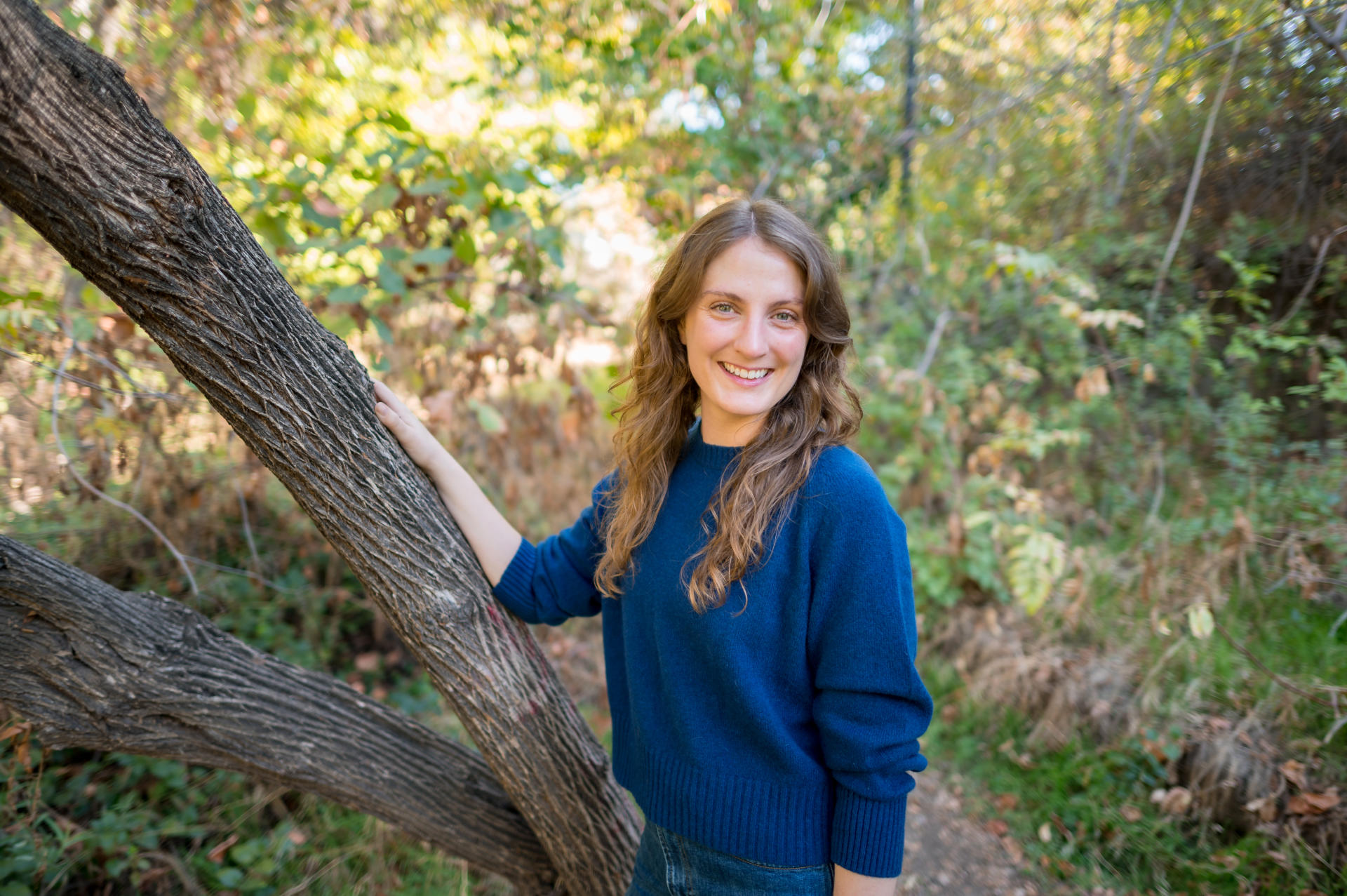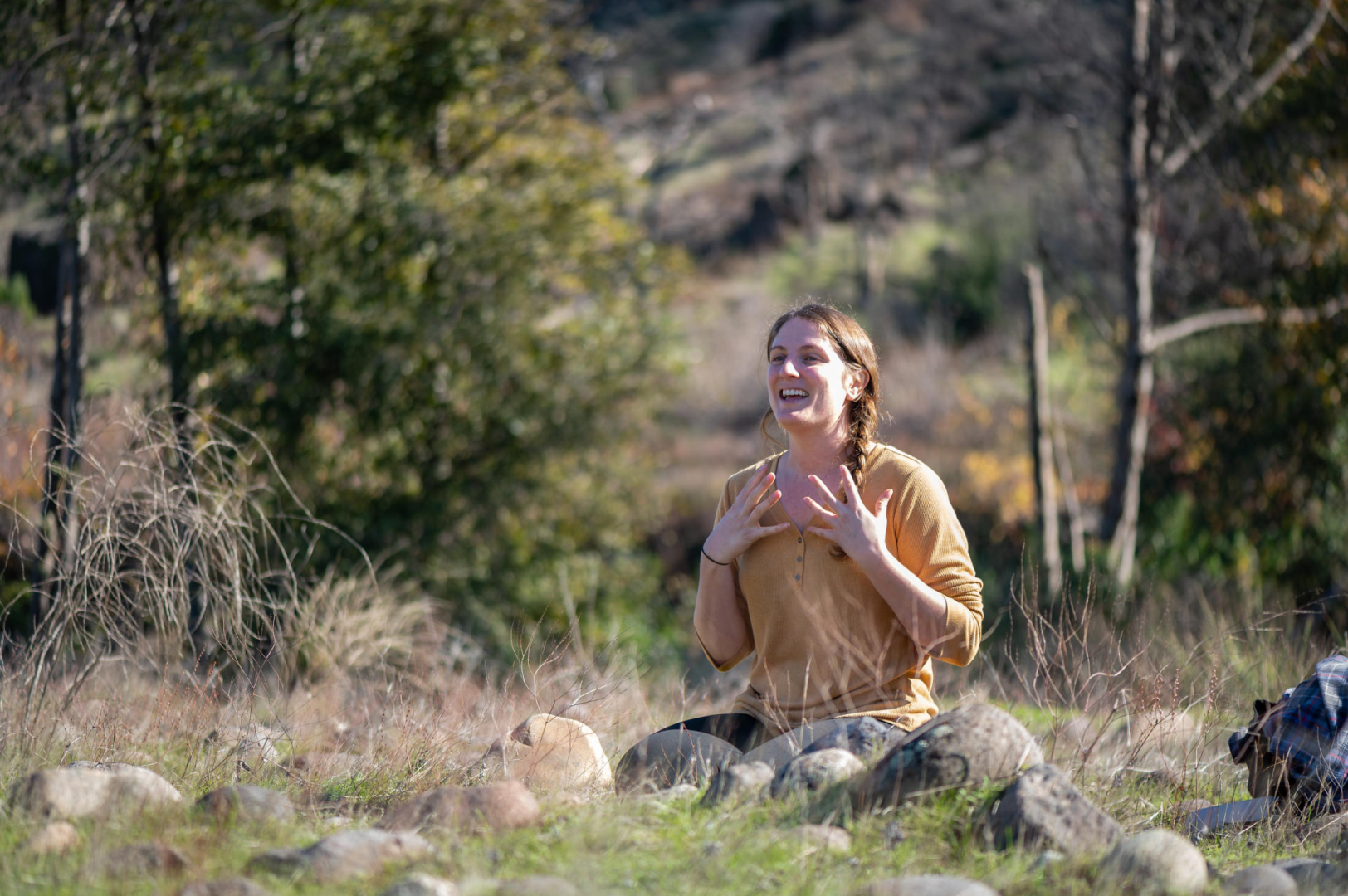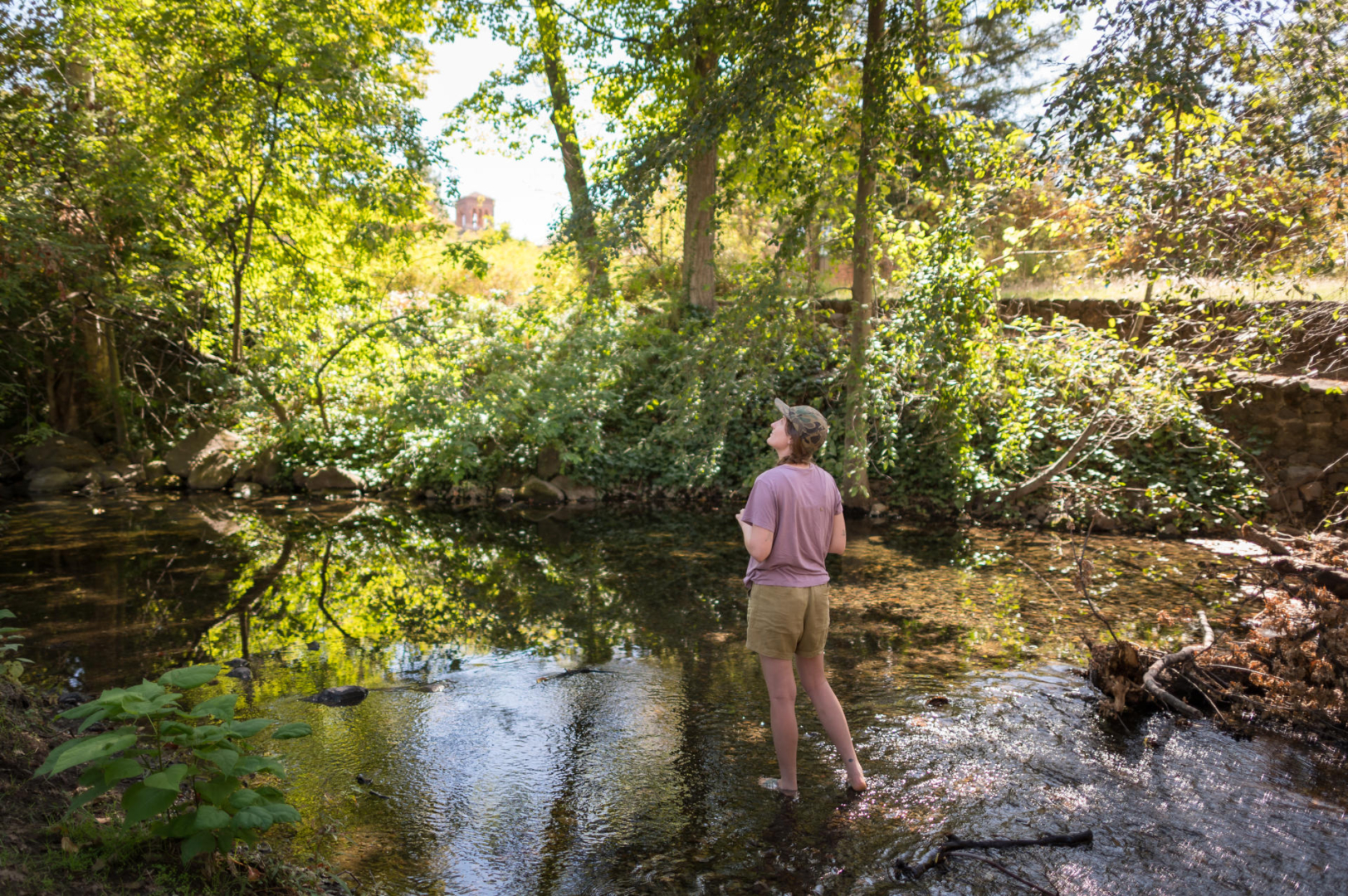Alumna Chooses Nature to Nurture Others

Big Chico Creek Ecological Reserve (BCCER) Ecotherapy Program Manager Blake Ellis is a certified forest therapy guide with the Association of Nature and Forest Therapy (ANFT), who seeks to take a post-anthropocentric view of environmental and social justice by supporting her community in processing trauma, grief and rebuilding connects to place, nature, and each other on Wednesday, October 5, 2022 in Chico, Calif. (Jason Halley/University Photographer/Chico State)
Blake Ellis is wired to work outdoors.
Born in Tallahassee, Florida, and raised in Evansville, Indiana, Ellis has been drawn to and relished spending time outside for as long as she can remember. Whether camping with her family, swimming, hiking, and canoeing at Girl Scouts camp, or watching her mother volunteer to rehabilitate sick, injured, or orphaned birds, nature was a source of both joy and comfort.
“As a kid, I was always outside doing all kinds of things—running, climbing, fishing, exploring,” she said. “I was lucky enough to grow up in a rural area where I could go for acres and acres and acres exploring the woods.”
Today Ellis (MSW, ’21) is at the leading edge of harnessing the natural world’s healing powers—even when that environment itself may trigger anxiety. As a certified forest therapy guide, she leads participants to think mindfully about how the natural world impacts our well-being, from easing anxiety to calming the nervous system to deepening connection through our senses.
“For me, it’s about helping people foster a sense of kinship and reciprocity with the natural world and recognizing that relationship to place and connect with nature,” she said. “I think that is absolutely essential for health and wellness—individually but also community health and wellness and the health of our ecosystem.”
After earning her degree in human resource management from Florida State University in 2010, Ellis asked herself the question many newly minted college graduates have: “Now what?”
“I graduated at the peak of the financial crisis,” she said. “I couldn’t find a job, even though I had this undergraduate degree.”
Seizing the opportunity, Ellis traveled. After two years living in New Wylie, South Carolina, and Atlanta, Georgia, she taught English for a year in Taiwan. She worked for World Wide Opportunities on Organic Farms, an organization that facilitates homestays in exchange for farming participation, on a pair of organic farms in Taiwan and for 10 months at a New Zealand farm. Realizing she was on her path to finding her passion, she returned to Evansville in January 2015, ready for her next step.

“I realized that I care about building community and finding that nature connection tending to the land,” she said. “I had been so untethered for four or five years, and I was ready to put down roots.”
In May 2015, she moved to Chico with her best friend, thinking it would be an appropriate launching spot to find purpose in a larger city on the West Coast.
“I came here with all my belongings in the back of my car, thinking that I was going to move somewhere else,” she said. “Then I thought, ‘Wait, I’m looking for community, my best friend in the whole world lives here, I have to start here.’ I spent a couple of weeks here and fell in love with this community—I never left.”
After the 2018 Camp Fire, Ellis worked in disaster case management for AmeriCorps and noticed a pattern amongst her and her colleagues’ clients—an overwhelming depth of grief over the loss of the Ridge’s ecosystem and environment.
“I was really curious about ecological grief and climate grief because I was experiencing that myself,” she said. “The grief I was noticing in our community was not an abstract kind of grief you feel, say, for the polar bears. People were grieving the loss of their home environment, the place they felt deeply connected to and familiar with.”
The term for this is “solastaglia,” a neologism that can be broken down to “solace” (meaning comfort) and “algia” (which is pain).
“You can define it as the mental, emotional, and spiritual impacts of environmental degradation, or the loss you feel when your beloved place or home environment is transformed beyond recognition,” Ellis explained.
She considered how she could learn more and progress in the environmental and social service fields while making a living doing it. With that in mind, in fall 2019, she enrolled in Chico State’s MSW program.

Pulling from her own experience, Ellis based her master’s thesis on solastaglia, learning along the way the potential healing power of forest therapy. When she learned the practice was happening at the University’s Big Chico Creek Ecological Reserve (BCCER), she explored the certification process and learned there was an open spot. Wasting no time, she joined the next cohort and went through the six-month certification process provided by the Association of Nature and Forest Therapy.
Ellis’ thesis chair was faculty member Susan Roll, who found her bright, engaged, and curious, adding that her work with solastalgia was vital.
“Blake’s deep commitment to healing, her connection to the natural world, and her enduring optimism are evident anytime you spend time with her,” she said. “Her work, which has translated brilliantly into her position running the Ecotherapy Program at BCCER, is a perfect complement to the stewardship of this sacred land.”
Today, Ellis leads four to five sessions a month at BCCER, on the Chico State campus, in Bidwell Park, or at Paradise Recreation and Parks District locations. This restorative health practice offers an evidence-based sequence that encourages participants to slow down, relax, connect with their senses, and engage with the natural world. Ellis would like to see more participants, particularly students, because of the practice’s mental health benefits.
“I think if we empower people with that knowledge and education, that can really support our community wellness,” she said. “For me, the most valuable intervention we offer is forest therapy. It’s just been beautiful to bring students, and now community members, together to do this.”
Ellis’ hope is that the program will grow in Butte County and throughout the North State, and, since climate crises appear to be here to stay in California, can even become a template for other CSU campuses.
“We’re still growing and figuring out a lot of our processes and systems,” Ellis said. “But I’m confident that in a few years, our next step will be delivering those best practices and models to other communities.”
As part of Wildcat Weekend, Chico State will host a forest therapy walk in Cedar Grove in Lower Bidwell Park on Saturday, October 8, from 2 to 4 p.m. Registration is currently open. To find forest therapy sessions led by Ellis and other certified therapists, visit the Ecotherapy Program page.


